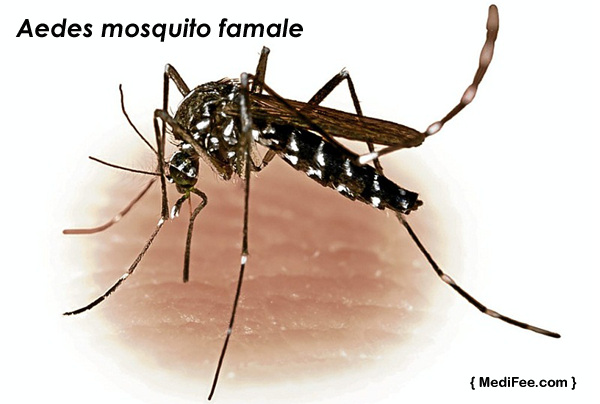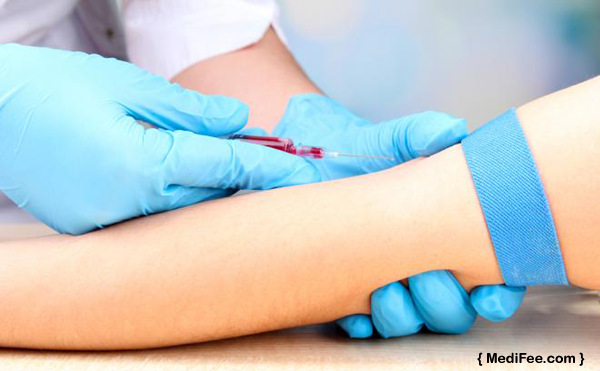Dengue is a virus and it causes infection that is transmitted when an infected female Aedes mosquito bites a person. The person suffers from dengue fever, also termed as “breakbone fever” or “dandy fever”. Thus dengue disease is borne by female Aedes mosquito. Anyone, irrespective of their age can get this disease; but in people with weak immune system it may be more severe. As far as geographic areas are concerned, the disease is prevalent in the tropical and sub-tropical regions and mostly in semi-urban and urban areas. The occurrence of dengue globally has increased dramatically in recent decades. 
As already mentioned, the Aedes female mosquito is the main vector of dengue. Post virus incubation period (Period between the mosquito bite and appearance of dengue symptoms), the infected mosquito can transmit the virus throughout its life. Unfortunately infected persons are primary carriers and multipliers of the dengue virus because they serve as the source of virus for mosquitoes that are uninfected. Persons, already infected with the dengue virus are able to transmit the infection through Aedes mosquitoes, after the first signs of the disease appear in them.
Diagnosis of Dengue:
The diagnosis of dengue depends on the detection of immunoglobulin. This detection is the primary technique for the laboratory diagnosis of dengue. Immunoglobulins are also termed as antibodies. The immune system of our body produces substances in response to foreign substances or antigens like viruses, fungi, bacteria or even cancer cells. These
antibodies merge with the foreign substances; as a result the cells of the body’s immune system neutralize or destroy those foreign substances. Our body makes different antibodies to fight different antigens. Antibodies can be broadly classified into 5 types- IgA, IgG, IgM, IgD and IgE. 
In case of laboratory diagnosis of dengue, the detection of IgM and IgG antibodies is the primary technique. These tests are required to detect a current or recent infection. Detection of dengue may require a combination of these two tests as the infected body may produce different levels of antibodies throughout the illness.
-
IgM antibodies test:
IgM is the largest type of antibodies, which is present mainly in the blood and lymph fluid. This is the first antibody that our body produces to combat a new infection. If a person is infected with dengue, tests for IgM will be most effective when performed within a week or 10 days after the exposure; the reason is that the levels of IgM in the blood rises within a few weeks after the infection and decreases over the course of time.
-
IgG antibodies test:
IgG plays a vital role in fighting viral and bacterial infections and is present in all body fluids. The levels of IgG rise when the infection becomes acute and persists for a longer time. There may be some cases when a person has been already exposed to the dengue virus prior to the present infection. A certain level of antibodies is maintained in their blood and this can affect the study of laboratory results.
- If the blood test result is positive IgM and IgG, it means that the patient got the infection recently (may be some weeks back).
- If the IgM is negative or low with positive IgG, it means the patient got the infection sometime in the past.
- If the test results for IgM is negative and/or IgG is also negative, it is likely that the person is not having dengue infection.
Besides the antibodies test, molecular testing which detects the presence of the virus itself is also considered a good test for diagnosing dengue. But this test is not available at all places. Along with the test results, a physician will also consider case history of the person and the places where the person has traveled in recent times.
Dengue:
Causes:
Dengue is caused by the bite of an infected Aedes mosquito, which attacks during the day. Again any other mosquito biting the infected person can also spread it to other persons, who are uninfected.
Symptoms:

The occurrence of dengue fever is sudden and it persists for a long time. Severe headaches, joint and muscle pain, vomiting, pain behind the eyes, nausea, skin rash that appears 3-4 days after the fever onset, mild bleeding like bleeding gums, nose bleeding are the common symptoms of dengue disease.
Incubation period:
The incubation period for dengue fever is 4-10 days.
Tests:
For detecting dengue, two tests known as antibody test and molecular testing are used.
Prevention of Dengue: 
To protect yourself from dengue, you must take measures to control or eradicate those dangerous mosquitoes. Many government initiatives have been taken to decrease the number of such mosquitoes; but the results are not very satisfactory. However, you may follow some basic rules to keep the disease in control:
- Empty dirty water from trash cans, unused bottles, flower pots, old tires etc.
- Wear socks, shoes, sleeves and pants covering your arms and legs when you go to some mosquito-infested areas.
- Use mosquito repellent creams (containing at least 10% concentration of DEET) as prescribed by your healthcare professional.
- Use mosquito repellent sprays if you are travelling to some dengue-affected area.
- Stay indoors for sometime after sunrise, before sunset and early evening.
- Clean your house and surroundings regularly so that mosquitoes don’t find any place for their breeding habitat.
- If your bedroom is not screened or air-conditioned, make sure you use mosquito-nets whenever you sleep-during day or night.
- If you have symptoms of dengue, talk immediately with your doctor.
- If any of your family members have dengue, take measures to protect yourself and the remaining members from mosquito-biting. Since, mosquitoes biting the infected family member can bite others and spread the infection, extra care and effort must be taken.
Very much helpfull and mindblowing article on dengue